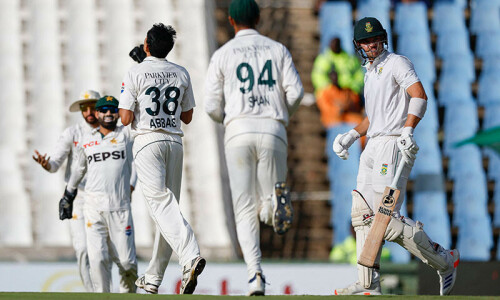
As Australia look to make history by winning the 2011 Champions Trophy (CT) and become the first team to ever win the coveted title four years in a row, Pakistan will be groping in the dark in their efforts to regain the lost glory.
Undoubtedly, the Champions Trophy is regarded as the toughest of all hockey events and provides the best chance to all top teams to assess themselves at the international level. The December 3-11 event in New Zealand, shifted from New Delhi after factions in Indian hockey federation, is more important as it comes just seven months before the London Olympics. So little wonder that all the top eight teams will try their level best to show their worth in the last major international tournament prior to it.
For Pakistan, the CT will serve a dual purpose. The magnanimous decision of the International Hockey Federation to give wild cards to the sub-continent’s teams (India lost the chance due to shifting of the event), helped Pakistan to stage a comeback in the top eight fold after missing the last three CT events. Firstly, Pakistan will be aiming to improve their current ninth ranking and will also try to sustain that lost place in this prestigious event which it introduced in the hockey calendar in 1978.
To say that the challenge ahead in New Zealand is tough is an understatement, but Pakistan's recent showings hint that if proper planning is put in place and that plan is implemented by the players then it is a possibility that the green shirts can improve upon their fifth finish in the 2006 Champions Trophy and seventh in their last CT appearance in Kuala Lumpur in 2007. It will be the much needed fillip before the Olympics.
Moreover, the new format of the event, with top two teams from each group to qualify for the semi-finals, unlike the previous format of top two teams playing the final, gives all the teams more chances to sneak into the last four. But even for that a team has to win at least two of the three games.
Former Olympian and coach Shahnaz Shaikh said the new format can help Pakistan qualify for the semis.
“You need six points to get into the semi-finals and Pakistan can achieve that provided they keep consistency in their performance which has been missing in their recent performance and preserve energy during the 70-minute play. I have noticed they fare badly in the first 10 minutes and in the last 10 minutes and concede goals in these two periods,” noted Shaikh.
Pakistan is placed in Group A with defending champions Australia, Great Britain and Spain. All three teams are dangerous. Under Ric Charlesworth, Australia clinched the World Cup in India last year and has shown remarkable progress. But for the Trophy, Australia will be hard pressed as they miss experienced players like Mark Knowles, Glenn Turner, Simon Orchard, Russell Ford, Graeme Begbie, Rob Hammond and Grant Schubert — most of them through injury. To add to this injury list, Charlesworth has taken a big risk by resting regular goal-keeper Nathan Burgers and instead given chance to two new goalies. Other teams can exploit that, but can only take Australia lightly on their own perils.
While Australia celebrated the world title in 2010, Pakistan finished at their worst ever 12th position. But a lot has changed since the Delhi debacle, notably Pakistan has an inspiring coach in Michel van den Heuvel.
“The first thing I did when I became coach was to take a team picture and put all the staff members in the middle, to show them there is no hierarchy in sport. We are one team with all working towards the same goal. They had a system of junior players carrying the bags of the senior players — almost treating them like heroes. Luckily, that is not an issue anymore since my arrival. They know I expect everyone to work equally hard,” Heuvel said.
And that allowed the management to leave out super star Rehan Butt from the scheme of things. Although, on seniority, Sohail Abbas, goal-keeper Salman Akbar and Shakeel Abbasi should be treated as top players but that is not the case with the Dutchman. He gave number two goal-keeper Imran Shah more chances which the youngster justified with some good show. Abbas has also been told in clear words that he needs to convert penalty corners into goals or he loses his worth. At the twilight of his career and on an umpteenth comeback, Abbas can enter the Hall of Fame if he shines in both the Trophy and then in the Olympics.
Defender Mohammad Imran is back as captain after a brief stint by Shakeel Abbasi, that again on the advice of the Dutch coach. Abbasi has been an under-performer but he did show more responsibility as captain. It remains to be seen how he fares in the event, maybe his penultimate before the Olympics.
Pakistan's recent win over Australia, a 4-3 upstaging of their superior rivals in the three-nation event last month, was also encouraging. It was a sharp turn around from the 8-2 drubbing in the league match in the same event. Noted hockey analyst Ijaz Chowdhry said beating Australia was a good sign.
“Although, I still believe it would be a miracle if we win the Champions Trophy, but yes you need to give credit to Pakistan for beating Australia, who never lose a final by experimenting,” said Chowdhry.
“If that same level of play is maintained, only then Pakistan can achieve better results.”
Great Britain and Spain are the two other teams. Pakistan has lost to both in recent competitions and will find it difficult to overturn that. Preserving energy and not indulging in an individual game can help Pakistan.
So the test is on. It is a brief seven month period where Pakistan hockey can attain top slot.













































